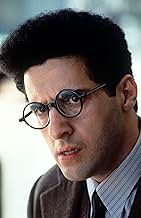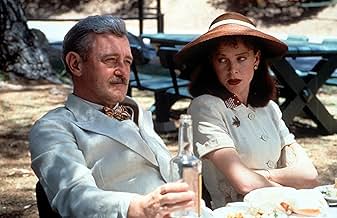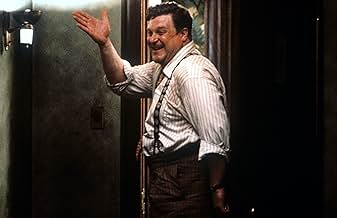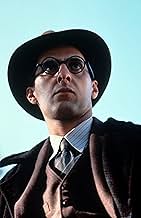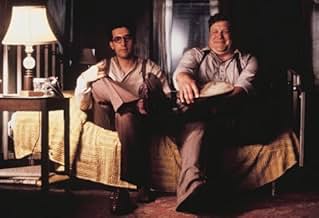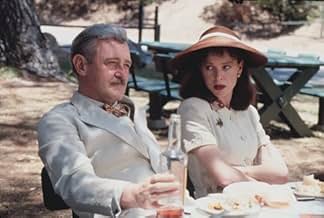Barton Fink
- 1991
- Tous publics
- 1h 56min
Un dramaturge renommé de New York est convié en Californie pour écrire des scénarios de film : il y découvrira le revers de la médaille hollywoodienne.Un dramaturge renommé de New York est convié en Californie pour écrire des scénarios de film : il y découvrira le revers de la médaille hollywoodienne.Un dramaturge renommé de New York est convié en Californie pour écrire des scénarios de film : il y découvrira le revers de la médaille hollywoodienne.
- Réalisation
- Scénario
- Casting principal
- Nommé pour 3 Oscars
- 19 victoires et 29 nominations au total
Meagen Fay
- Poppy Carnahan
- (as Megan Faye)
Avis à la une
You are either going to love or hate this one, and I doubt you'll know which until it's over. Maybe you won't know even then.
In 1941, Barton Fink (John Turturro) is a successful Broadway playwright. Now that he's got some success under his belt, he says he wants to write plays for "the common man". But his agent has a tempting offer. A movie studio wants him to come to LA and write screenplays for 1000 dollars a week. The agent convinces him to go. Barton checks into the Hotel Earle, which has ornate decorations in the common areas, but is a dump from the standpoint of Barton's room. The heat has the wallpaper peeling off the walls. The sole decoration in Barton's room is the picture of a woman sitting on the beach, her arm raised to block the sun. Remember this picture - it's important.
Barton's first assignment is to write a "wrestling picture" starring Wally Beery. But Barton has writer's block for assorted reasons, one of them being that he knows nothing about this subject. So he stares at his typewriter with the dread an insomniac might stare at his bed. But then what seemed to start out being a film about how the studio system can beat the creativity and the confidence out of a successful writer changes course and becomes something that is completely surreal and even nightmarish by the end. I can really say nothing more specific than that without giving things away.
The Coens wrote Barton Fink when they were having writer's block trying to write Miller's Crossing because of the complexity of the plot. So did they manage to pack lots of symbolism into a tight, coherent package, or did they simply let their imagination run wild and undisciplined in an attempt to get back on track on the other film? I have no idea. I just know that I like it and - for me - it's great for repeat viewings.
One more thing - How can it be so hot in LA, and then suddenly WWII has started, which would make it December? Why is it Barton doesn't seem to notice WWII has started without being told and then really has no reaction. He really isn't plugged into "the common man" is he?
In 1941, Barton Fink (John Turturro) is a successful Broadway playwright. Now that he's got some success under his belt, he says he wants to write plays for "the common man". But his agent has a tempting offer. A movie studio wants him to come to LA and write screenplays for 1000 dollars a week. The agent convinces him to go. Barton checks into the Hotel Earle, which has ornate decorations in the common areas, but is a dump from the standpoint of Barton's room. The heat has the wallpaper peeling off the walls. The sole decoration in Barton's room is the picture of a woman sitting on the beach, her arm raised to block the sun. Remember this picture - it's important.
Barton's first assignment is to write a "wrestling picture" starring Wally Beery. But Barton has writer's block for assorted reasons, one of them being that he knows nothing about this subject. So he stares at his typewriter with the dread an insomniac might stare at his bed. But then what seemed to start out being a film about how the studio system can beat the creativity and the confidence out of a successful writer changes course and becomes something that is completely surreal and even nightmarish by the end. I can really say nothing more specific than that without giving things away.
The Coens wrote Barton Fink when they were having writer's block trying to write Miller's Crossing because of the complexity of the plot. So did they manage to pack lots of symbolism into a tight, coherent package, or did they simply let their imagination run wild and undisciplined in an attempt to get back on track on the other film? I have no idea. I just know that I like it and - for me - it's great for repeat viewings.
One more thing - How can it be so hot in LA, and then suddenly WWII has started, which would make it December? Why is it Barton doesn't seem to notice WWII has started without being told and then really has no reaction. He really isn't plugged into "the common man" is he?
I'm still not entirely sure what to think of this film. One thing is sure, it won't be easy to forget. This movie is clearly the product of a writer who has struggled with their muse, and equally one who has a healthy mistrust of Hollywood - the sausage grinder. Although Hollywood has been critiqued in film before in similar ways, memorable scenes, clever dialogue, quality acting, and a surreal plot and setting, add together to make this an unusual and different film. Maybe another viewing might add a different dimension. This is by no means 'light entertainment' and it leaves plenty of questions unanswered. But on the whole, an intelligent movie, if something of an enigma. My vote 7/10
I am absolutely amazed at the fantastic taste of the imdb readership, having loved this film for years and always been told by people I'd told about it and persuaded to watch that it was no good, I finally find some other people out there who love it as much as me, posting (mostly) extremely positive comments...This is a fabulous film, dripping with a brooding, sticky atmosphere that draws you in to the clammy world of Barton Fink, sat in his hotel room listening to the creaking of the wallpaper as it dribbles moistly from the walls, searching for inspiration in his tacky painting and dusty typewriter...Perhaps it is a little dark for some tastes, but as black comedy goes this is the blackest and the most biting there is, the Hollywood system and New York theatrical snobbery lampooned with equal viciousness. Deep insight into the nature of the creative spirit, a plethora of fine performances bringing at first stereotypical characters to full life (despite the unreal, fable-like atmosphere created by the slimy, glistening colours reminiscent of the films of Jeunet&Caro...), and many moments of hilarity make this a perfect movie, one I would not hesitate in recommending to anyone despite the fairly high probability they will hate it. A lack of any underlying morality, an absence of absolutes of right and wrong, good and bad, give this film a unique feeling that it could go anywhere. The last twenty minutes are about the most powerful I have ever seen in anything, at the end of almost every scene I thought it could end there and be an amazing film, yet each further scene only added further depth and poignancy. The first time I saw it, it left me drained, mind spinning, hands shaking, barely able to reach for the remote to rewind it to watch it again...
While many of us know "Fargo" and "Big Lebowski", many fans still haven't heard of "Barton Fink", which is too bad. This is probably John Turturro's best role (and his least weird). Tony Shalhoub also gives an outstanding performance (at least as good as he was in "The Siege").
John Goodman? Heck, even he is pretty good here and I'm not a big fan of his (though the Coen Brothers do him justice like no others can). His portrayal of the questionable neighbor just really suits him.
There is supposed to be deep symbolism in this film -- some say it's an allegory for the rise of Nazism (and I can see that), while others say it's just a critique of Hollywood. I don't know. But, you know what? No matter what it's about, it's beautiful in a nihilistic way... and you will want to know: what's in the box? And I'm not going to tell you.
John Goodman? Heck, even he is pretty good here and I'm not a big fan of his (though the Coen Brothers do him justice like no others can). His portrayal of the questionable neighbor just really suits him.
There is supposed to be deep symbolism in this film -- some say it's an allegory for the rise of Nazism (and I can see that), while others say it's just a critique of Hollywood. I don't know. But, you know what? No matter what it's about, it's beautiful in a nihilistic way... and you will want to know: what's in the box? And I'm not going to tell you.
Watched the film, understood 60% of it. Went to read its reviews after, understood 75% of it. Now i have to watch it again from another angle to completely get it. This is what the Coen brothers make you do.
Le saviez-vous
- AnecdotesThe first film to win all three major awards (Palme D'or, Best Director, and Best Actor) at the Cannes Film Festival. Also, it was unanimously chosen for the Palme D'or.
- GaffesBriefly visible at the top of the screen when Detective Mastrionotti introduces himself to Barton.
- Citations
Charlie Meadows: Look upon me! I'll show you the life of the mind!
- Crédits fousThe 20th Century Fox logo appears over silence; the "fanfare" is not played.
- ConnexionsEdited into The Clock (2010)
- Bandes originalesFor Sentimental Reasons
by Edward Heyman, Al Sherman and Abner Silver
Licenced with Permission the Successors of Marlo Music Corporation (ASCAP)
Meilleurs choix
Connectez-vous pour évaluer et suivre la liste de favoris afin de recevoir des recommandations personnalisées
Détails
- Date de sortie
- Pays d’origine
- Langue
- Aussi connu sous le nom de
- Бартон Фінк
- Lieux de tournage
- Sociétés de production
- Voir plus de crédits d'entreprise sur IMDbPro
Box-office
- Budget
- 9 000 000 $US (estimé)
- Montant brut aux États-Unis et au Canada
- 6 153 939 $US
- Week-end de sortie aux États-Unis et au Canada
- 268 561 $US
- 25 août 1991
- Montant brut mondial
- 6 154 231 $US
- Durée
- 1h 56min(116 min)
- Couleur
- Mixage
- Rapport de forme
- 1.85 : 1
Contribuer à cette page
Suggérer une modification ou ajouter du contenu manquant




